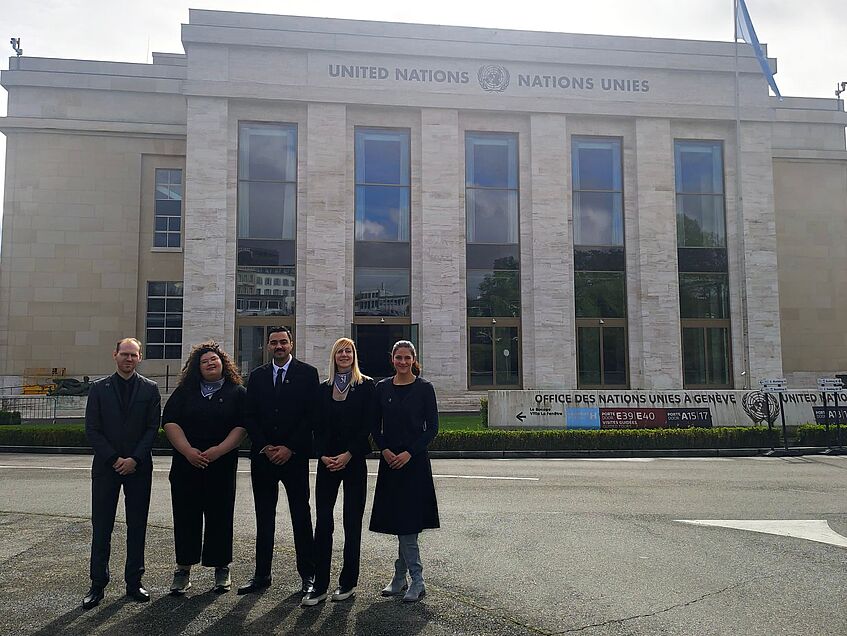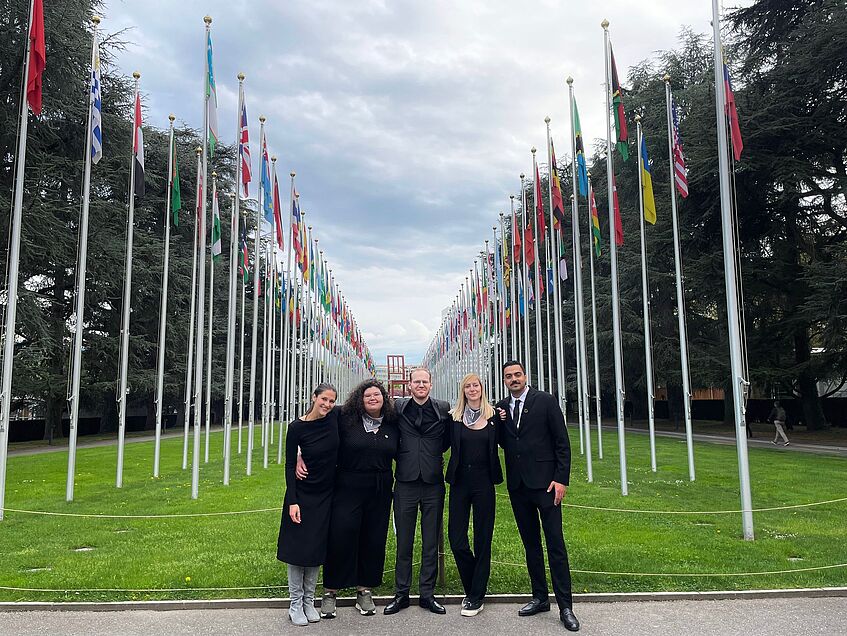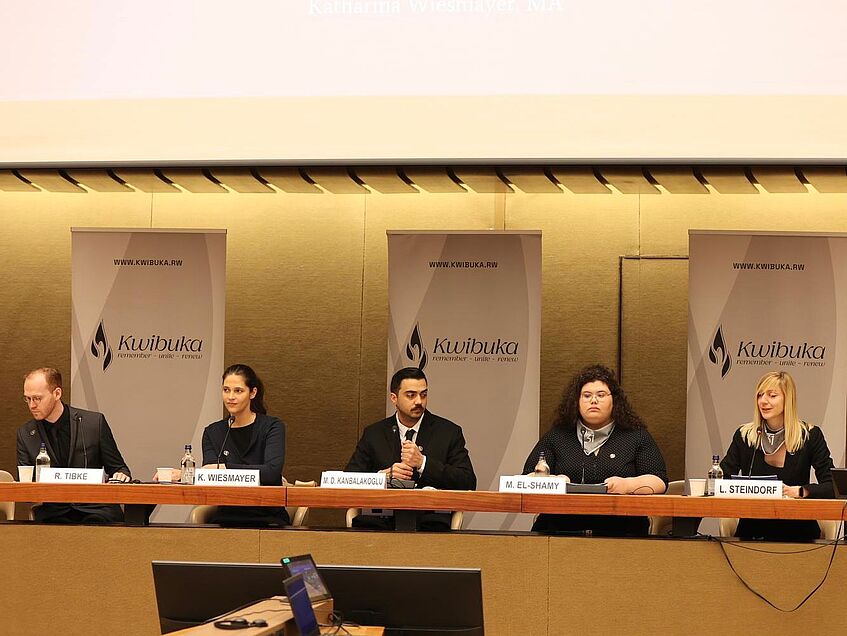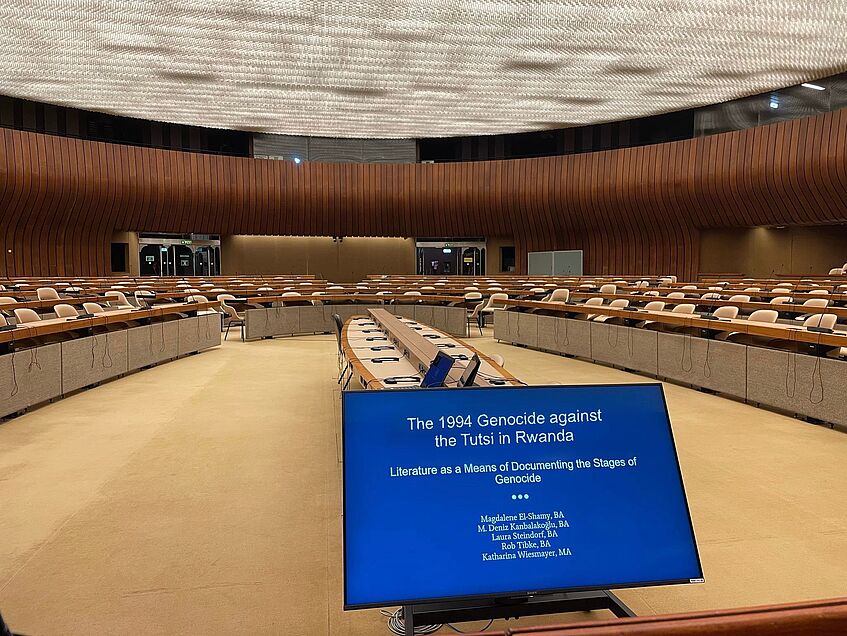Studierende der Afrikawissenschaften zu Besuch in der Rwandischen Botschaft in Genf




Studierende der Afrikawissenschaften zu Besuch in der Rwandischen Botschaft in Genf
Bericht der Studierenden:
In April 2025, five students from the University of Vienna – Magdalene El-Shamy, Deniz Kanbalakoglu, Laura Steindorf, Rob Tibke and Katharina Wiesmayer – were invited to the United Nations in Geneva, Switzerland, to give a presentation on “The 1994 Genocide against the Tutsi in Rwanda – Literature as a Means of Documenting the Stages of Genocide”. This report is a reflection on their experience.
In autumn of 2023, we, a group of students from Comparative Literature and African Studies from disparate backgrounds and manifold perspectives, joined professor Rémi Tchokothe’s course “Rwanda 1994: Humanity’s collective Memory(cide) 30 years later”. We were faced with a diverse corpus that testified to the survivors’ experiences of the 1994 Genocide against the Tutsi in Rwanda.
Within the click of a mere hundred days, approximately 800 thousand Tutsi were murdered systematically. The corpus illuminated this gruesome history: uncovering the social discord wrought during the Belgian colonial era, the resultant intensification of genocide ideology during the 1950s, and the final apogee of mass extermination in 1994. We also read of the intergenerational traumas and inflictions which remain. But how to take this knowledge outside the seminar walls; to make this history palpable? We decided our best course of action was to prepare an exhibition, located at the Department of African Studies, which delineated the eight stages of genocide, as promulgated by Gregory Stanton in 1996. Each stage would explain and make real the Genocide against the Tutsi.
On the opening night of our exhibition, we shared this history with an audience of students, members of the local public as well as individuals from the Rwandan diaspora community. We felt especially humbled that one of the guests was a representative of the Embassy of Rwanda in Geneva.
A little less than a year later, we received a message from our professor: the embassy would like us to come to Geneva to give a presentation on our research and exhibition. The same representative attending our exhibition had kindly thought of us and suggested that we include our presentation as part of the Kwibuka – the annual commemoration event to remember the 1994 Genocide against the Tutsi in Rwanda. Every genocide leaves a wound in our shared humanity; we were greatly honoured to be asked to continue our endeavour to fight memorycide, a mission our professor had instilled within us.
We returned to our research and began the undertakings for a much larger presentation in quite a different context. Our audience would be composed of survivors, diplomats, academic
researchers and curious members of the Swiss public. Every week, we confined ourselves to a stuffy study space, finessing the structure and content, rehearsing all the while supporting each other. In the penultimate week, we booked a seminar room at the university for our final rehearsal, presenting to professor Tchokothe as well as a party of wonderful friends and family who took the time to give us their insightful feedback.
On April 13th, with our exhibition posters reprinted and a surfeit of nervous excitement, we boarded the plane to Switzerland.
We were so grateful: after warmly welcoming us at the airport, the Embassy led us to our hotel. Not only did they pay for our flight and all accommodations, they also ensured we were a part of the team from the outset, and that we wouldn’t have anything to worry about.
Our posters were put on display at the venue’s entrance on the day of our presentation. The setup was made possible through the generous support of the Rwandan Embassy – particularly Betty Dusenge, the Embassy’s Second Counsellor, and Ornella Mihigo, who was always warm and considerate as she assisted us with logistics, and moderated the event. In addition to Ornella’s moderation, Edmond Tubanambazi, the Embassy’s First Counsellor, delivered thoughtful remarks.
After introducing ourselves and the university course, we began our PowerPoint presentation, having hopefully translated the themes of our exhibition into a digital format. We began by sharing our initial artistic approach to the project, presenting artworks that we had made and which enabled us to engage with genocide on a more profound level. By reference to our posters, historical documentation and literary testimonials, each of us explained at least one stage in the history of the Genocide against the Tutsi in Rwanda. Finally, one of our group members, Rob Tibke, shared an original poem, offering his personal artistic contribution to fight against historical erasure – against memorycide.
The discussion during the Q&A session that followed our presentation was truly thought-provoking. Upon the first question, all of us eagerly reached for our pens to note down the complex thoughts being provoked. Our work was resonating with the audience. Unfortunately, despite audience engagement, our time was limited. Nevertheless, even had this been only the beginning of a broader conversation, we felt imbued with yet more inspiration to continue our research into memory studies and African literature.
Our presentation took place before the main act of commemoration. In an august hall inside the United Nations, we witnessed Belko Kenza Naike performing her poem, a pained paean to
Rwanda today and consecration of the survivors’ memories. Her mother, Sissi Dimitrie Mukanyiligira, then shared her testimony, her life story as a survivor and her message to remain indefatigable, even in the most dire and unjust realities. Every person rose to give her a standing ovation.
Meeting survivors of the 1994 Genocide against the Tutsi in Rwanda, and being welcomed so warmly by the community in Geneva, made a lasting imprint. Commitment to human dignity should stand behind the font of any monograph. After our presentation we felt, and continue to feel, certain of this. Still, engaging so deeply with such an immense topic was at times overwhelming. Some of us felt nervous many weeks in advance, others only in that instance before stepping onto stage. For the majority of us, English is our second or third language: our task at times winged dauntingly above us. Throughout it all, we supported one another, and worked through personal hurdles as a collective. The project required courage, empathy, and trust – not only in ourselves, but in each other. Together, we have created something memorable and meaningful which we will carry with us for a long time.
We have come to understand that empathy is not just a feeling. Much rather, empathy is a practice, a habit. In this context, empathy becomes the highest form of respect, and our attempt to preserve memory and the dignity of survivors was met with kindness and appreciation. At the final lunch, each of us were gifted a Rwandan name: to Deniz Nkubito, the warrior; to Katharina Kayitesi, the one endowed with gifts; to Laura Uwicyeza, the one who brings light; to Magdalene Mukasonga, the mother; and to Rob Mugabo, the courageous man. This spontaneous ‘baptism’ was not only joyous, but also constituted a moment for reflection. We were reminded of the privileges we carry: the freedom to study, to travel and to speak up. This moment highlighted the bonds we have formed, and the power which lies in respectful conversation.
Through a commitment to empathising with others, our work turned a student presentation into an experience – one that continues far beyond the final slide.
